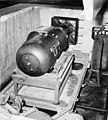Wikipedia:Selected anniversaries/August 6
This is a list of selected August 6 anniversaries that appear in the "On this day" section of the Main Page. To suggest a new item, in most cases, you can be bold and edit this page. Please read the selected anniversaries guidelines before making your edit. However, if your addition might be controversial or on a day that is or will soon be on the Main Page, please post your suggestion on the talk page instead.
Please note that the events listed on the Main Page are chosen based more on relative article quality and to maintain a mix of topics, not based solely on how important or significant their subjects are. Only four to five events are posted at a time and thus not everything that is "most important and significant" can be listed. In addition, an event is generally not posted this year if it is also the subject of the scheduled featured article or picture of the day.
To report an error when this appears on the Main Page, see Main Page errors. Please remember that this list defers to the supporting articles, so it is best to achieve consensus and make any necessary changes there first.
Images
Use only ONE image at a time
-
Gertrud Ederle
-
Zayed bin Sultan Al Nahyan
-
Colonel Paul Tibbets, pilot of the Enola Gay, waving from its cockpit
-
Little Boy, the first atomic bomb used in warfare
-
The Genbaku Dome, a standing memorial of the bombing of Hiroshima
-
The mushroom cloud over Hiroshima after the dropping of Little Boy
-
Effects of the atomic bombing on Hiroshima
-
Sidi Mohamed Ould Cheikh Abdallahi
-
Meteorite fragment ALH 84001
-
Tim Berners-Lee
Ineligible
| Blurb | Reason |
|---|---|
| Bolivia (1825) and | refimprove |
| 1538 – Spanish conquistador Gonzalo Jiménez de Quesada founded a European urban settlement in what is today Bogotá, Colombia. | unreferenced sections |
| 1870 – Franco-Prussian War: At the Battle of Wörth, German troops under Crown Prince Friedrich Wilhelm defeated the French under Marshal Patrice MacMahon near the village of Wœrth. | no footnotes |
| 1914 – First World War: Germany's Atlantic U-boat Campaign began when ten U-boats sailed from their base in Heligoland to attack Royal Navy warships in the North Sea, the first ever submarine war patrol in history. | refimprove section |
| 1915 – First World War: The Allied Powers launched the Battle of Sari Bair at Gallipoli. | unreferenced |
| 1926 – American competitive swimmer Gertrude Ederle became the first woman to swim across the English Channel. | refimprove section |
| 1964 – U.S. President Lyndon B. Johnson signed the Voting Rights Act into law, outlawing literacy tests and other discriminatory voting practices that had been responsible for widespread disfranchisement of African Americans. | TFA for 2014 |
Eligible
- 1506 – Muscovite–Lithuanian Wars: The Grand Duchy of Lithuania achieved one of the greatest Lithuanian victories against the Tatars in the Battle of Kletsk.
- 1777 – American Revolutionary War: The Battle of Oriskany, one of the bloodiest battles in the North American theater of the war, was fought about six miles (10 km) east of Fort Stanwix, New York.
- 1930 – New York City judge Joseph Force Crater mysteriously disappeared, eventually earning him the title of "The Missingest Man in New York".
- 1945 – World War II: The U.S. Army Air Force bomber Enola Gay dropped an atomic bomb named "Little Boy" on Hiroshima, Japan, killing as many as 140,000 people.
- 1956 – DuMont, one of the world's first television networks, aired its last program.
- 1962 – Jamaica gained full independence from the United Kingdom, more than 300 years after the English captured it from Spanish colonists in 1655.
- 1966 – Sheikh Zayed bin Sultan Al Nahyan became emir and ruler of Abu Dhabi, succeeding his brother, Sheikh Shakhbut bin Sultan Al Nahyan, who was deposed in a bloodless coup d'état.
- 1988 – New York City Police officers charged a crowd protesting a curfew for the previously 24-hour Tompkins Square Park, sparking a riot that led to more than 100 complaints of police brutality.
- 1996 – NASA announced that the meteorite known as ALH 84001, discovered in the Allan Hills of Antarctica, may contain evidence of life on Mars, but further tests were inconclusive.
- 2008 – Mauritanian President Sidi Mohamed Ould Cheikh Abdallahi was ousted from power by a group of high-ranking generals that he had dismissed from office several hours earlier.
- 2011 – Following the death of a Tottenham man by the Metropolitan Police of London, thousands of mostly young males rioted in several London boroughs and in cities and towns across England.
August 6: Feast of the Transfiguration (Gregorian calendar); Independence Day in Jamaica (1962)
- 1806 – The Holy Roman Empire was dissolved by its last emperor, Francis II (pictured), during the aftermath of the War of the Third Coalition.
- 1890 – At Auburn Prison in Auburn, New York, US, William Kemmler became the first person to be executed in an electric chair.
- 1964 – American researcher Donald Currey had a bristlecone pine tree known as Prometheus cut down, only to find that it was the oldest known non-clonal organism ever discovered, at least 4,862 years old at the time.
- 1991 – British computer programmer Tim Berners-Lee first posted files describing his ideas for a system of interlinked, hypertext documents accessible via the Internet, to be called a "World Wide Web".
- 2010 – A cloudburst and heavy overnight rains triggered flash floods, mudslides, and debris flows across a large part of Ladakh, a region of the northernmost Indian state of Jammu and Kashmir, leaving at least 255 people dead.











